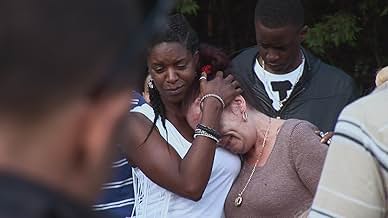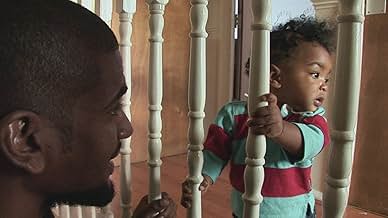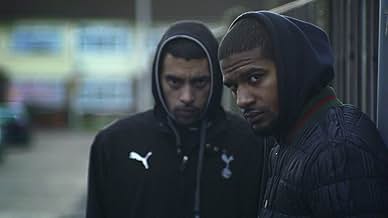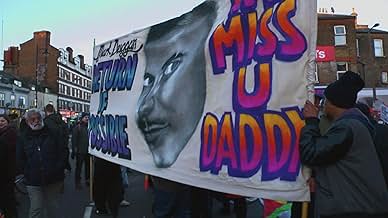The police killing of Mark Duggan in London, 2011, ignited the worst civil unrest in recent British history and made headlines around the globe.The police killing of Mark Duggan in London, 2011, ignited the worst civil unrest in recent British history and made headlines around the globe.The police killing of Mark Duggan in London, 2011, ignited the worst civil unrest in recent British history and made headlines around the globe.
- Nominated for 1 BAFTA Award
- 2 wins & 4 nominations total
Featured reviews
Another tragic tale of a poor, young black man killed by police in what are – at best – highly questionable circumstances, and the riots that followed. But this story takes place in London, not the U.S. and is a powerful and timely reminder that issues of poverty, racism, police violence are far from uniquely American.
Amponsah defies the expected by focusing much less on the whys and hows of the shooting itself, and much more on the lives those left behind – specifically the two best friends of the victim, Mark Duggan. One, Marcus, is fueled by anger and grief at not only the death of his friend, but at the situation of his people, his neighborhood. He spends time in prison for helping to start the riots that followed the shooting – though the film briefly raises questions as to the fairness of the charge. Marcus was certainly present, and participated to some extent, but his claim that he also tried to stop things when the riot went from being an expression of outrage to an excuse to loot and pillage seems to be supported to at least some extent by closed circuit TV footage. He finds some solace in Muslim faith, and ultimately seems determined to try and make a change for the better in his poverty stricken neighborhood.
The other friend, Kurtis, is a lighter soul – funny and talkative, though no less hurt and angry at both Duggan's death, and the situation of his community.
The film can feel scattershot at times – it's neither fully an expose of an incident of injustice, nor a character study, nor a wider political polemic. In jumping around between those elements, it can sometimes undermine the sense of focus. But at the same time, there is something brave and new in trying to create a mosaic that covers both the past and the present, and does nothing to deny the bleakness of the situation, yet still offers hope, and people refusing to give up. In this, the film's strengths and weaknesses are really just two sides of the same coin.
I'm also open to the fact that I went in expecting more of an expose than an essay, so on 2nd viewing I might find it easier to go with the flow of the films that is, instead of being thrown by what it wasn't.
Certainly intelligent and important, and far from a simple story or simplistic approach.
Amponsah defies the expected by focusing much less on the whys and hows of the shooting itself, and much more on the lives those left behind – specifically the two best friends of the victim, Mark Duggan. One, Marcus, is fueled by anger and grief at not only the death of his friend, but at the situation of his people, his neighborhood. He spends time in prison for helping to start the riots that followed the shooting – though the film briefly raises questions as to the fairness of the charge. Marcus was certainly present, and participated to some extent, but his claim that he also tried to stop things when the riot went from being an expression of outrage to an excuse to loot and pillage seems to be supported to at least some extent by closed circuit TV footage. He finds some solace in Muslim faith, and ultimately seems determined to try and make a change for the better in his poverty stricken neighborhood.
The other friend, Kurtis, is a lighter soul – funny and talkative, though no less hurt and angry at both Duggan's death, and the situation of his community.
The film can feel scattershot at times – it's neither fully an expose of an incident of injustice, nor a character study, nor a wider political polemic. In jumping around between those elements, it can sometimes undermine the sense of focus. But at the same time, there is something brave and new in trying to create a mosaic that covers both the past and the present, and does nothing to deny the bleakness of the situation, yet still offers hope, and people refusing to give up. In this, the film's strengths and weaknesses are really just two sides of the same coin.
I'm also open to the fact that I went in expecting more of an expose than an essay, so on 2nd viewing I might find it easier to go with the flow of the films that is, instead of being thrown by what it wasn't.
Certainly intelligent and important, and far from a simple story or simplistic approach.
STAR RATING: ***** Saturday Night **** Friday Night *** Friday Morning ** Sunday Night * Monday Morning
In August 2011, 29 year old suspected gang member Mark Duggan was shot dead by armed police on the streets of Tottenham, while they executed the titular heavy force procedure. This sparked a spate of rioting and mayhem across London, that gradually spread to the other major cities across the UK. The facts surrounding what lead up to the shooting and the narrative of Mark Duggan as an individual appear to be somewhat skewed, and filmmaker George Amponsah here casts a shadow on Marcus Knox Hooke and Kurtis Henville, two of Duggan's best childhood friends, as Hooke prepares to be sentenced for his role in the riots, and Henville goes about trying to find a job, while they both await the outcome of a trial that will decide whether their friend was lawfully killed or not.
The summer of 2011 is etched in my mind, and probably the minds of most other people in the UK at the time, as being the only real time when the law and order we take for granted in our everyday lives completely broke down, and terrifying mayhem and pandemonium broke out, the likes of which I'm glad to say I personally managed to avoid. But no one could have failed to notice the aftermath, or the sense of apprehensiveness it caused in people. Afterwards, some tried to say it had been building up for a while, and that the Duggan gentleman's death had been the final straw, and it's a narrative Amponsah seems to have latched on to in this one sided and unconvincing film that tries to warm us towards two of Duggan's dubious friends.
In amongst the present day events, Amponsah is inclined to take us back in time to the Broadwater Farm riots of 1985, in which PC Keith Blakelock was murdered, and use this as a launch pad to fuel his narrative of police hostility toward the black community that has apparently persisted for three decades, during which time many officers will have come and gone. It's certainly used to try and explain the mind sets of his two chosen subjects, and the decisions they made and the way they are. Sadly, despite their general affability toward the camera, neither still manage to come off as the types you'd be happy passing in a dark alley one night, injecting 'you get me' into seemingly every sentence and still displaying elements of the cocksure, swaggering 'hood life' attitude that seep through the cracks of their front and make them unsympathetic figures.
The ambiguity of who Duggan was, and the true circumstances surrounding his death will probably always be tooed and froed, but he was undeniably part of a pretty corrosive, ugly culture that your average person, black or white, probably wouldn't have met their end at. Amponsah may try and balance it out, quoting the number of deaths in police custody over the years at the end and pointing out that Duggan was falsely claimed to have been involved in a shootout, but the fact remains he's produced an unbalanced, uneven and unconvincing documentary that fails to provide any counter argument and has its sights clearly pointed one way. *
In August 2011, 29 year old suspected gang member Mark Duggan was shot dead by armed police on the streets of Tottenham, while they executed the titular heavy force procedure. This sparked a spate of rioting and mayhem across London, that gradually spread to the other major cities across the UK. The facts surrounding what lead up to the shooting and the narrative of Mark Duggan as an individual appear to be somewhat skewed, and filmmaker George Amponsah here casts a shadow on Marcus Knox Hooke and Kurtis Henville, two of Duggan's best childhood friends, as Hooke prepares to be sentenced for his role in the riots, and Henville goes about trying to find a job, while they both await the outcome of a trial that will decide whether their friend was lawfully killed or not.
The summer of 2011 is etched in my mind, and probably the minds of most other people in the UK at the time, as being the only real time when the law and order we take for granted in our everyday lives completely broke down, and terrifying mayhem and pandemonium broke out, the likes of which I'm glad to say I personally managed to avoid. But no one could have failed to notice the aftermath, or the sense of apprehensiveness it caused in people. Afterwards, some tried to say it had been building up for a while, and that the Duggan gentleman's death had been the final straw, and it's a narrative Amponsah seems to have latched on to in this one sided and unconvincing film that tries to warm us towards two of Duggan's dubious friends.
In amongst the present day events, Amponsah is inclined to take us back in time to the Broadwater Farm riots of 1985, in which PC Keith Blakelock was murdered, and use this as a launch pad to fuel his narrative of police hostility toward the black community that has apparently persisted for three decades, during which time many officers will have come and gone. It's certainly used to try and explain the mind sets of his two chosen subjects, and the decisions they made and the way they are. Sadly, despite their general affability toward the camera, neither still manage to come off as the types you'd be happy passing in a dark alley one night, injecting 'you get me' into seemingly every sentence and still displaying elements of the cocksure, swaggering 'hood life' attitude that seep through the cracks of their front and make them unsympathetic figures.
The ambiguity of who Duggan was, and the true circumstances surrounding his death will probably always be tooed and froed, but he was undeniably part of a pretty corrosive, ugly culture that your average person, black or white, probably wouldn't have met their end at. Amponsah may try and balance it out, quoting the number of deaths in police custody over the years at the end and pointing out that Duggan was falsely claimed to have been involved in a shootout, but the fact remains he's produced an unbalanced, uneven and unconvincing documentary that fails to provide any counter argument and has its sights clearly pointed one way. *
Details
- Release date
- Country of origin
- Official site
- Language
- Also known as
- Down by Law
- Production company
- See more company credits at IMDbPro
Box office
- Gross worldwide
- $48,441
- Runtime
- 1h 25m(85 min)
- Color
Contribute to this page
Suggest an edit or add missing content













